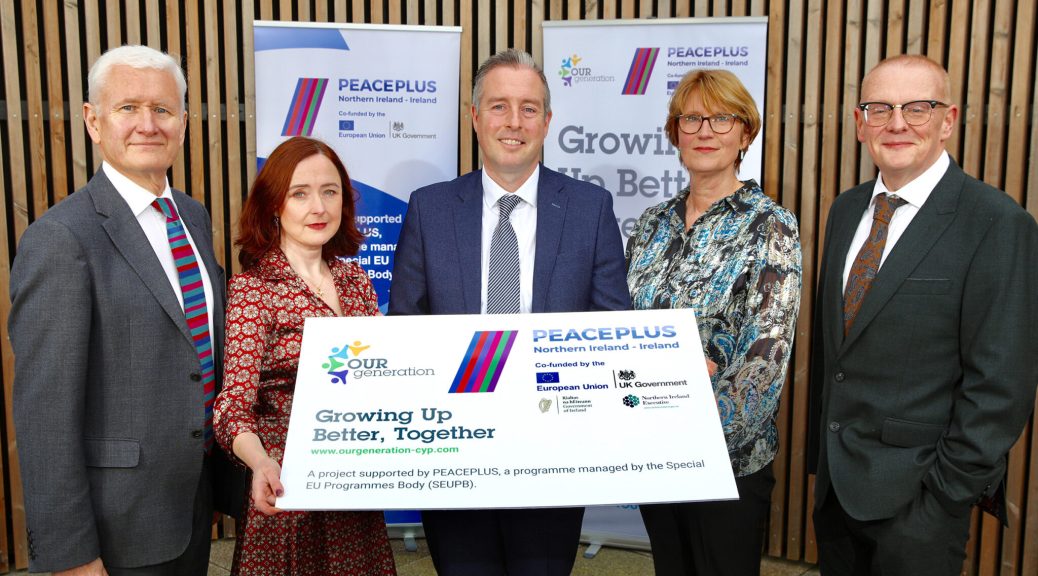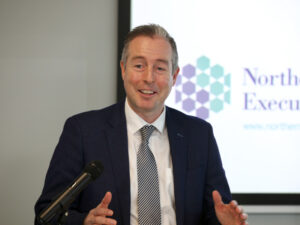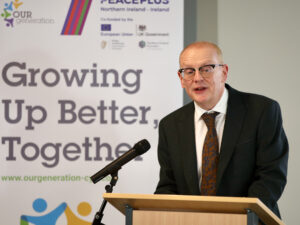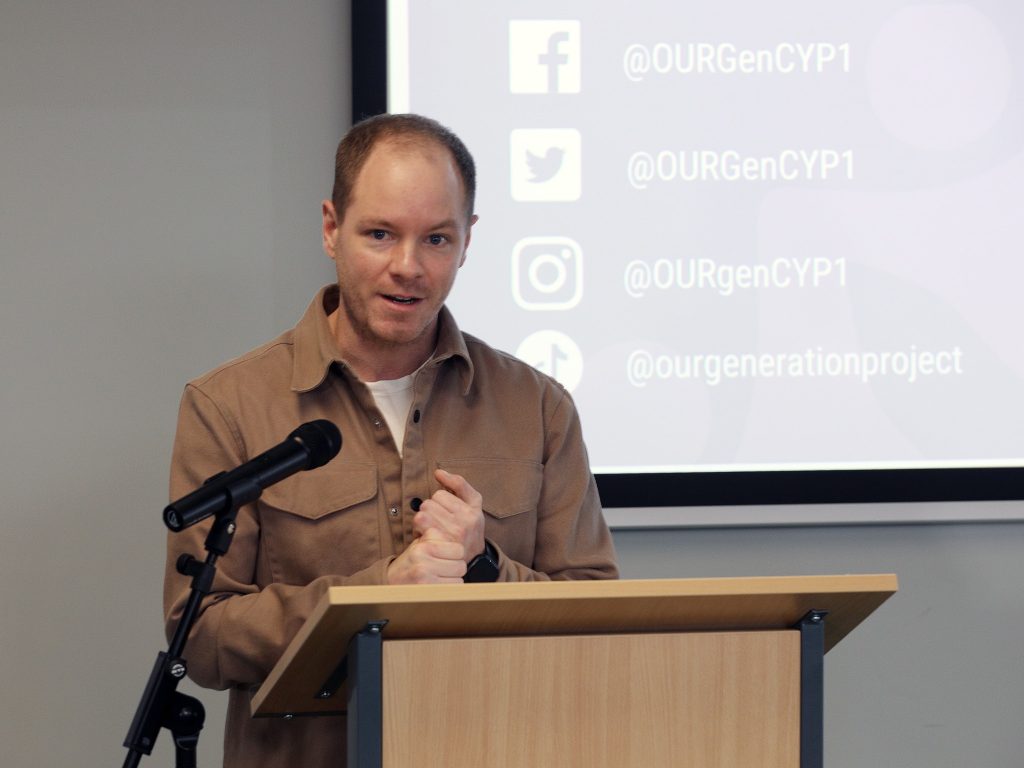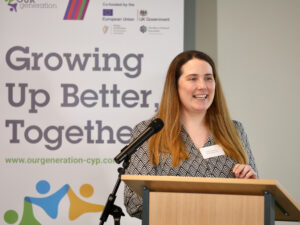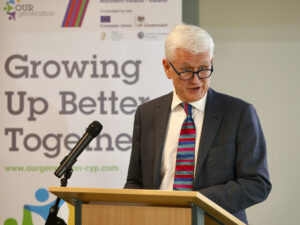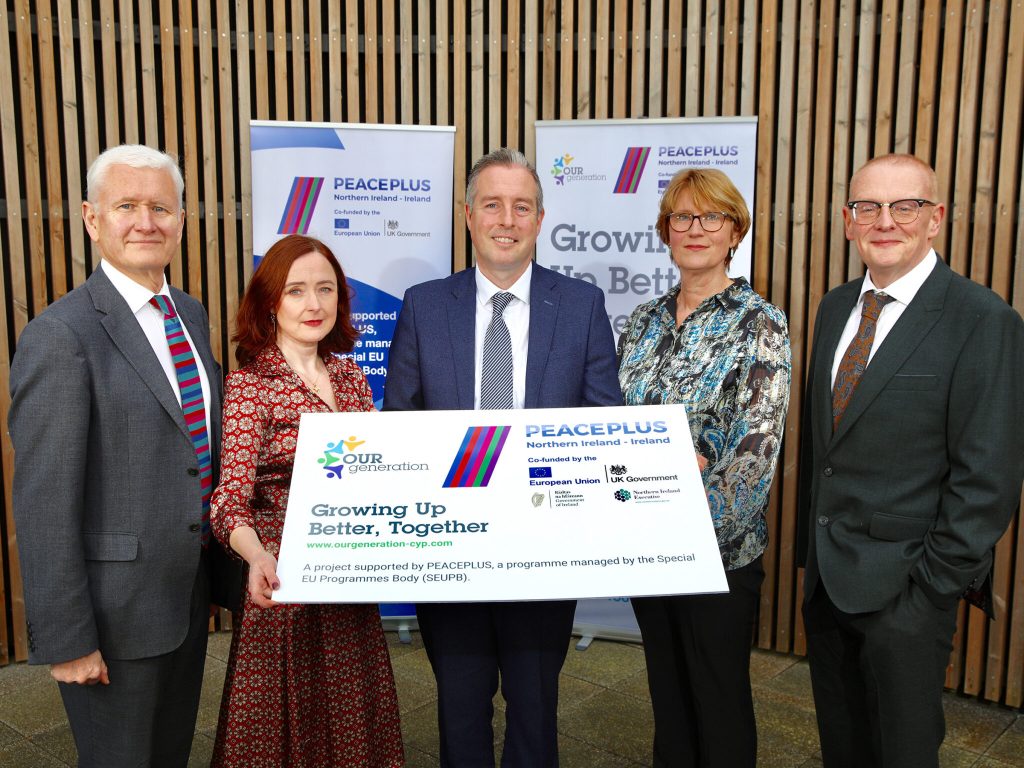
The OUR Generation Project was officially launched in Belfast on Wednesday, November 13, supported by Northern Ireland’s Education Minister, Paul Givan, MLA, who said it was a “critically important” initiative which would support many young people.
Also attending the event at the New Forge Sports Complex and Event Hub were project partners, funders and supporters. These included the Director of Programmes, Managing Authority at the Special EU Programmes Body (SEUPB), Paul Beattie and Social Psychology Lecturer at Ulster University, Dr Claire Campbell.
Opening the proceedings, Minister Givan said he was delighted to have been able to attend and that he thought it was important he supported the event.
Describing OUR Generation as an “important programme,” he said that with “a continued rise in mental health issues amongst young people,” the project would “create significant opportunities” and deliver much welcomed additional mental health support.
“The demand on existing mental health and wellbeing initiatives has been significant and because of this funding more young people will benefit,” he said. “For many young people, access to high-quality programmes for mental health has changed their lives and in some cases, has saved lives. It makes a lasting and positive change for communities.
“Often, the work that you do can be unseen by outside society… But that network is critically important in our society. It’s vital we can support that.”
Reflecting on his own life, Minister Givan added that everyone faced challenges and difficult days, posing the question – how do we get through it?
“Challenges will always come in your life,” he said. “Creating that resilience is so important, especially for our young people. If you don’t provide the right support at the right time, that can take you down into dark places. My grandmother took her own life when my father was 16 years of age… I never got to know her. It got to the point where she wasn’t able to cope anymore.”
Reflecting on the fact that people will “always face really difficult, dark moments in their lives,” Minister Givan said it was therefore important to support our young people – particularly in “a world where there’s so much uncertainty.”
“How do you support people to come through those difficulties and challenges? That next generation – how do we support them? That’s why I just want to say thank you for all the work you’re doing. I really look forward to seeing the outcomes of the project.”
Empowering young people as ambassadors
As a cross-border initiative led by Action Mental Health, OUR Generation is focused on youth mental health and wellbeing, with fellow project partners including Donegal Youth Service, Cooperation Ireland, Youth Action NI, Youth Work Ireland, Playboard NI, Boys & Girls Clubs NI, Include Youth and Ulster University.
The latest phase of the project will run from 2024-2027, taking place in various education, youth and community settings across Northern Ireland and the border counties of Ireland. It will subsequently develop and deliver programmes focused on increasing mental health literacy, enhancing emotional resilience and building leadership skills in children and young people aged between nine and 25 years old. The project will also lead on research into mental health and the impact of trauma upon our communities.
It is anticipated that approximately 33,000 children and young people, along with 5,000 key youth workers will participate in the project overall.
Paul Beattie, the Director of Programmes, Managing Authority at the Special EU Programmes Body (SEUPB), said it was important that one of their six key themes was dedicated to empowering young people.
“By involving young people we’re empowering them to act as ambassadors within their communities,” he said.
He added that investing in projects like OUR Generation gave a focus to community leadership, as well as helping to sustain peace and good relations, supporting young people living with the legacy of the Troubles.
“Overall, the project will make a contribution to peace and reconciliation,” he said. “There’s an increasing demand to impact the mental health of young people and we really look forward to seeing the immense work of OUR Generation in touching the lives of more young people.”
Panel discussion
Following a brief video about the OUR Generation Project, which featured messages from the various partners, a panel discussion was facilitated by host, Curtis McCosh, from Cool FM. Taking part was Youth Wellbeing Specialist and counsellor, Sinead McIlvenna from Belfast charity, Lighthouse, along with Youth Project Coordinator, Mick Meehan, from North Belfast charity, Tackling Awareness of Mental Health Issues (TAMHI). Joining them was Stephen O’Donnell a volunteer from Donegal Youth Service (DYS) and Adam Murphy from Youth Action NI (YANI).
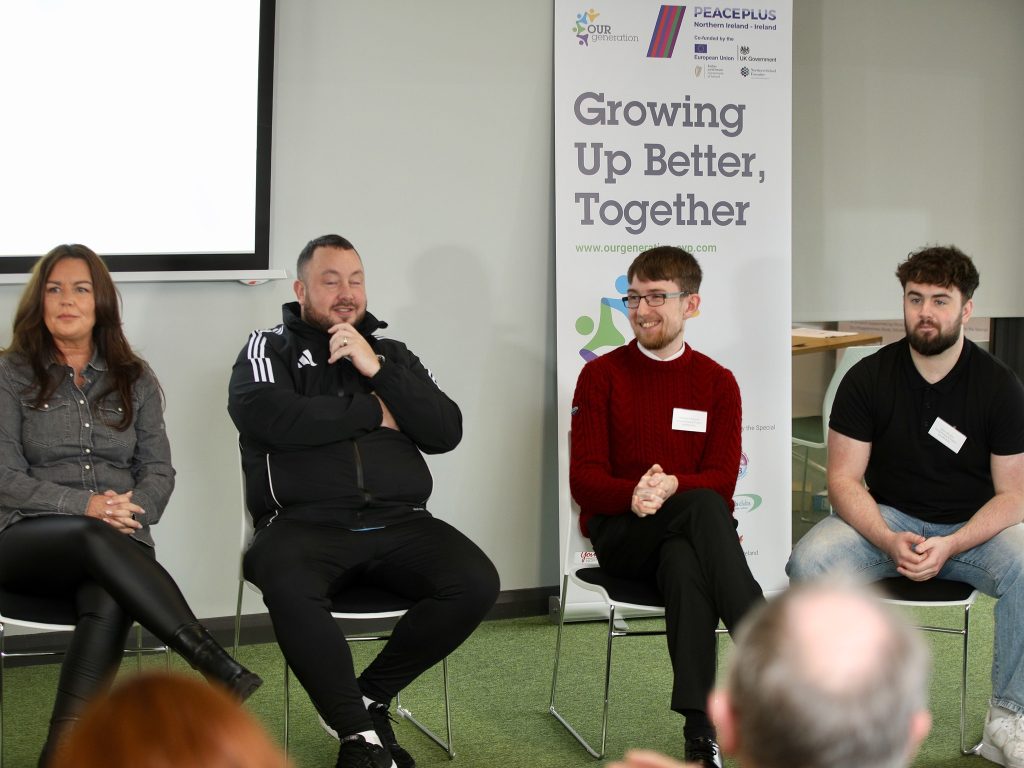
Having been introduced to the OUR Generation project through Cooperation Ireland, Sinead said they had done various work with young people as part of this, including around gender awareness. She added that trauma-informed counselling had been very beneficial to the young people they worked with in schools, while laughter yoga had also been a hit.
“Laughter yoga is brilliant, as some kids are very shy and introverted,” she said. “It really helps the kids engage. Laughter is very infectious, so when one person laughs, everyone laughs. Cooperation Ireland offered us the training, so we’re now all trained in laughter yoga.
She added that the leadership conference which had taken place in Derry-Londonderry previously, had been “amazing” as an opportunity to see how other organisations were working.
This was a point reiterated by Mick from TAMHI, who said that, “getting to actually meet other organisations and do some collaborative work was first-class.” He added that being part of OUR Generation to date had enabled them to deliver cross-border play schemes, helping them further in fulfilling their objective as a charity, which was to “shape change and save lives.”
“We teach mental health through play,” he said. “You go in and ‘play out’ hardship and then explain it through play. You can do it from primary school level right up to the highest pay grade. When we were invited up to Derry-Londonderry it was brilliant to go into a room and see so many positive people – and to meet some amazing people through the programme.”
Having come up with OUR Generation’s tagline of ‘Growing up better, together,’ fellow panelist, Adam, from YANI has been involved in youth work from a young age. He said it was great to have gone from being an OUR Generation project participant to a volunteer to now being a peer educator.
“The project helps you to learn new things and meet new people,” he said, adding that OUR Generation had made a massive difference to his work within the youth sector, opening up opportunities across wider Northern Ireland.
“A lot of the times, rural young people can feel they’re not being heard,” he said. “Being able to be involved in those conversations and then to go back into my local community means I can say, ‘this is where it’s going’. That’s had a massive positive impact on their outlook.”
Concluding the panel discussion, Stephen from DYS said that OUR Generation was a vital project for highlighting mental health resilience. He added that it gave “young people the power to understand that, if something is going wrong, there’s coping skills and methodologies to get through what’s going on.”
“Through talking, it will give you the chance to slowly come through and find your feet again,” he said.
Diverse social groups key for mental health
Also speaking at the launch was Dr Claire Campbell from OUR Generation partner, Ulster University, who highlighted the importance of social group membership for good mental and physical health. Using a practical activity to illustrate the point, Dr Campbell said that social identity theory showed people were “hard-wired for group membership.”
She added: “With more social group membership you have better physical and mental health, emotional wellbeing, quality of life, coping and resilience.” She added, however, that it was important to not only be part of social groups, but for those to be “across communities, not just in your own,” to ensure higher social identity complexity and a more open-minded attitude.
Preceding the final element of the day, which was a vocal performance of Unwritten from Cori Strain (YANI), David Babington – CEO of lead partner Action Mental Health – made the event’s closing remarks and wished the project well.
“Having just recently launched our “I AM SOMEONE” fundraising and mental health awareness campaign, we at Action Mental Health are all too aware of the very real stories behind the mental health statistics,” he said. “Statistics which, unfortunately, are still quite bleak – with one in five adults experiencing a mental health issue in their lifetimes and one in eight children facing emotional difficulties.
“Indeed, Northern Ireland continues to have some of the highest rates of mental ill-health in the UK and transgenerational trauma is a significant part of this. That’s why projects such as OUR Generation are so important – to safeguard the mental health and emotional resilience of the next generation and to equip them with leadership and life skills which they can carry forward into a more hopeful future.”
David added that the project would complement the great work already taking place within the mental health sector in Northern Ireland and that the programmes would “ultimately give youth a voice and allow them and their communities to be heard, regardless of religion, race, gender, identity or background.”
OUR Generation is supported by PEACEPLUS, a programme managed by the Special EU Programmes Body (SEUPB). PEACEPLUS represents a funding partnership between the European Union, the Government of the United Kingdom of Great Britain and Northern Ireland, the Government of Ireland and the Northern Ireland Executive.




